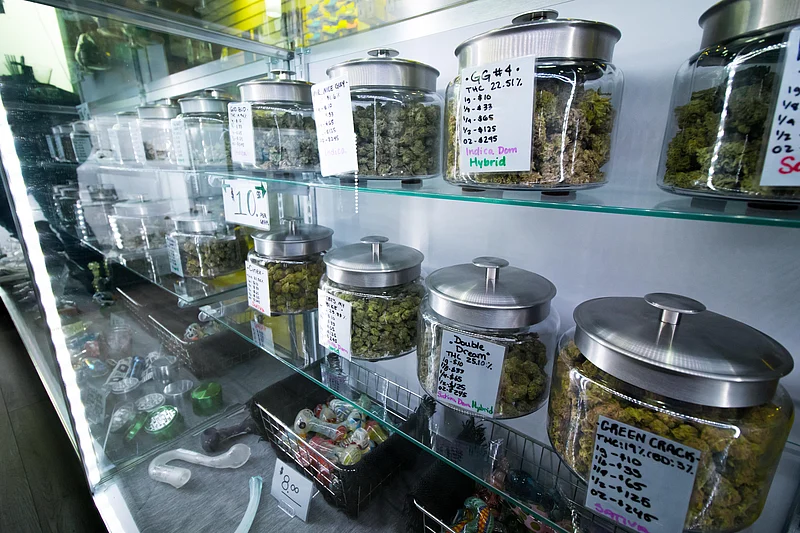(330) 876-1228
8507 Main StreetKinsman, OH 44428
(330) 876-1229

Cancer patients who use cannabis to relieve pain and improve appetite may be getting bad advice from dispensary staff, a new study suggests.
Doctors usually offer only spotty advice about pot to their patients and, although well-intentioned, staff at many cannabis dispensaries aren't well-versed or trained in what advice to give, the researchers said.
"If other studies replicate our results, then the medical establishment may need to standardize their approach to medical cannabis care in order to satisfy this widespread unmet need," said researcher Dr. llana Braun, chief of adult psychosocial oncology at the Dana-Farber Cancer Institute, in Boston.
For the study, Braun's team interviewed 26 workers at cannabis dispensaries in 13 states.
While the investigators found that workers were dedicated, their level of knowledge about the therapeutic use of cannabis was inconsistent. In many cases, dispensaries hire people for their selling skills, not their expertise in cannabis therapeutics. The researchers also found that dispensaries offered little or weak training on cannabis therapeutics.
Yet patients rely on the advice they get from dispensary staff, because many doctors say they don't feel qualified to offer advice about medical pot, research shows. In a previous study, Braun's team found that 80% of oncologists surveyed discussed medical cannabis with patients, but only 30% felt qualified to offer recommendations for its use.
"We know from other scientific studies that some physicians don't consider themselves competent to offer clinical advice about medical cannabis," said co-author Manan Nayak, a senior project director at Dana-Farber.
"Patients instead consult non-medical sources, including the cannabis dispensary, for advice and know-how. Medical professionals who defer making clinical recommendations may be relying on a group of professionals who view themselves as unevenly trained for the task," Nayak explained.
Paul Armentano, deputy director of the NORML Foundation, which advocates for the legalization of responsible use of marijuana by adults, reviewed the findings.
Armentano said that despite the changing cultural acceptance of cannabis and its legal status under state law, many physicians remain reluctant to speak with their patients about cannabis treatment options.
There are many reasons for their hesitancy, he said.
"In many instances, medical professionals have received little or no professional training on the topic," Armentano said. "In other instances, medical professionals may be formally discouraged from conversing with their patients about cannabis by their HMOs [health maintenance organizations]."
So, many patients turn to dispensary employees for answers. But in most cases, Armentano said, they are not qualified to provide medical advice or expertise.
"The time is long overdue for HMOs and others to encourage medical professionals to learn about cannabis and to speak freely with their patients about it," he said. "Further, training about cannabis, cannabinoids and the endogenous cannabinoid system should be included in students' medical-related curricula, and cannabis-related topics should be more prevalent in continuing medical education."
Groups like NORML also make efforts to debunk false claims regarding cannabis and/or certain cannabis products, Armentano said.
"Among these claims is the allegation that cannabis products may independently cure cancer in patients with the disease," he said. "The basis for this unsubstantiated claim comes from scores of preclinical models showing cannabinoids to be antineoplastic agents. However, large-scale, controlled clinical trials have not yet been conducted to substantiate these claims or to offer guidance on safety, dosing or efficacy."
Advocacy organizations can help patients gain more knowledge about the risks and benefits of pot, he said.
"Many have prioritized making the scientific literature about cannabis and its relative safety and therapeutic efficacy available to the public in an effort to both educate them and empower them to make informed and evidence-based decisions," Armentano said.
The research was published online Aug. 15 in JCO Oncology Practice.
More information
The U.S. National Cancer Institute has more about medical marijuana and cancer.
SOURCES: Ilana Braun, MD, chief, division of adult psychosocial oncology, Dana-Farber Cancer Institute, Boston; Manan Nayak, PhD, senior project director, Dana-Farber Cancer Institute, Boston; Paul Armentano, deputy director, NORML Foundation, Washington, D.C.; JCO Oncology Practice, Aug. 15, 2022, online
